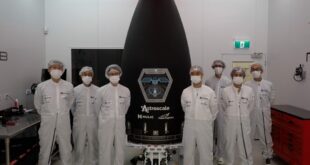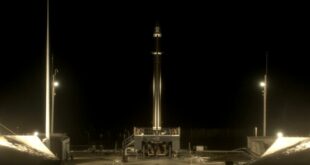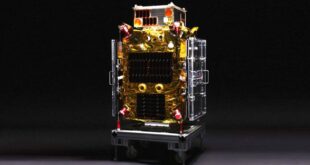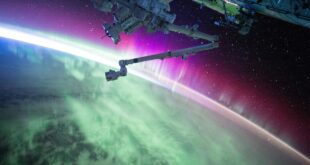SpaceWatch.Global asked its staff and contributors to review 2019 and provide an outlook into 2020. These personal reviews are being published during the holiday season. This is Harriet Brettle of Astroscale.
by Harriet Brettle
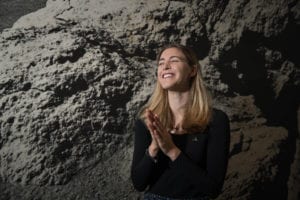
2019 has been an absolute whirlwind! This time last year I had just returned to the UK to join Astroscale, having left the planetary science graduate program at Caltech. I was leaving behind sunny California and, honestly, more than a little apprehensive about returning to England.
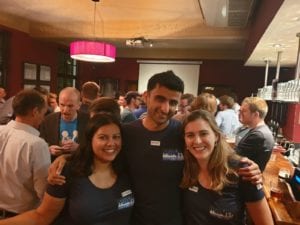 To counter my yearning for the buzzing LA space scene, in January and together with Manny Shar and Anushka Sharma, I co-founded the London Space Network. The idea was simple: London is full of many diverse space players but can often feel a little disconnected. Inspired by similar events in other cities, we decided to host monthly networking drinks for the entire space community. We began in the aptly named ‘Astronomer’ pub, not expecting many folks to show up but were blown away by the response. The network has gone from strength to strength, growing to a community of over 400 members and with fruitful connections at each event. If you’re in or around London, join us for a pint on 23 January at our first event of 2020! Elsewhere in the world, there are similar events cropping up all over: whether you’re in Washington D.C. or Oxford, LA or Paris, San Francisco or Tokyo, there’s a space network for you! If there’s none near you, why not make it your New Year’s resolution and start it yourself?
To counter my yearning for the buzzing LA space scene, in January and together with Manny Shar and Anushka Sharma, I co-founded the London Space Network. The idea was simple: London is full of many diverse space players but can often feel a little disconnected. Inspired by similar events in other cities, we decided to host monthly networking drinks for the entire space community. We began in the aptly named ‘Astronomer’ pub, not expecting many folks to show up but were blown away by the response. The network has gone from strength to strength, growing to a community of over 400 members and with fruitful connections at each event. If you’re in or around London, join us for a pint on 23 January at our first event of 2020! Elsewhere in the world, there are similar events cropping up all over: whether you’re in Washington D.C. or Oxford, LA or Paris, San Francisco or Tokyo, there’s a space network for you! If there’s none near you, why not make it your New Year’s resolution and start it yourself?
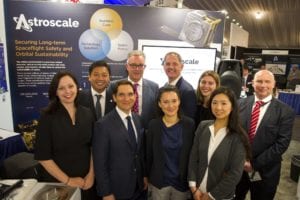 In January 2019, I started working at Astroscale as a business analyst, allowing me to combine my financial background with my passion for working in the space industry. I continue to be inspired by our mission to ensure long-term sustainability in space. It’s been a steep learning curve getting to grips with the technical side of the business but I’m grateful to work with some of the most friendly, passionate, and hard-working people who have helped me get up to speed. This year I began a collaboration with Professor Hugh Lewis at the University of Southampton to investigate the collision risk for satellite constellations and understand the effectiveness of different active debris removal strategies. It’s been a privilege to learn from Hugh’s expertise and understand the long-term consequences resulting from growing space debris. I look forward to sharing our results next year.
In January 2019, I started working at Astroscale as a business analyst, allowing me to combine my financial background with my passion for working in the space industry. I continue to be inspired by our mission to ensure long-term sustainability in space. It’s been a steep learning curve getting to grips with the technical side of the business but I’m grateful to work with some of the most friendly, passionate, and hard-working people who have helped me get up to speed. This year I began a collaboration with Professor Hugh Lewis at the University of Southampton to investigate the collision risk for satellite constellations and understand the effectiveness of different active debris removal strategies. It’s been a privilege to learn from Hugh’s expertise and understand the long-term consequences resulting from growing space debris. I look forward to sharing our results next year.
Space sustainability is increasingly recognised as an important challenge for the industry and this year has seen significant progress. The World Economic Forum is leading the development of a system to rate the sustainability of space systems that aims to increase transparency and incentivise responsible behaviour The United Nations Committee on the Peaceful Uses of Outer Space (UN COPUOS) approved 21 Long-Term Sustainability Guidelines and will establish a new Working Group to continue work on the long-term sustainability of outer space activities. There is much to learn from other industries, since systemic environmental challenges are sadly not unique to space, and I’m proud to be part of a team that is pushing forward.
Astroscale has been very supportive of my continued involvement with the Space Generation Advisory Council (SGAC), a global non-profit organisation that supports students and helps young professionals connect to the wider space industry. SGAC organises events across the world and this year I moderated a panel at the European Space Generation Workshop in London whilst our Chief Operating Officer, Chris Blackerby, moderated the Asia-Pacific workshop’s space debris sessions. The topic of space debris was raised repeatedly at the different events, highlighting the importance of space sustainability to the next generation. Astroscale’s CEO and founder, Nobu Okada, also joined the Advisory Board of SGAC this year and I feel very proud to work for a CEO and company that supports the next generation of space industry leaders.
2019 was the year I found my feet in the space industry. In the coming year I’m looking forward to the launch of Astroscale’s ELSA-d mission and building on this year’s foundation to strengthen the business case for debris removal services. I hope that the London Space Network continues to grow and that we see the UK space industry flourish. 2020 is set to be a fantastic year and I can’t wait to see what it will bring.
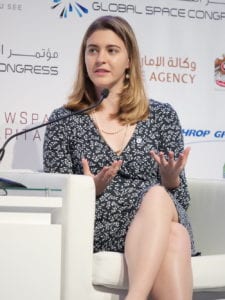 BIO: Harriet Brettle is a business analyst at Astroscale where she is working to develop a commercial solution to the threat of space debris. She is a co-founder of the London Space Network, organising monthly networking events to strengthen the UK space community. Harriet is also an active member of the Space Generation Advisory Council (SGAC) – a global non-profit that supports students and young professionals connect to the wider space industry – serving in multiple roles including as strategic partnerships coordinator. Harriet recently completed a masters in planetary science at the California Institute of Technology. Prior to Caltech, Harriet worked in finance at the Bank of England and the Federal Reserve Bank of New York, undertaking risk analysis of global financial institutions. Harriet has a keen interest in public engagement with space science, interdisciplinary collaboration, and the future of new space economy.
BIO: Harriet Brettle is a business analyst at Astroscale where she is working to develop a commercial solution to the threat of space debris. She is a co-founder of the London Space Network, organising monthly networking events to strengthen the UK space community. Harriet is also an active member of the Space Generation Advisory Council (SGAC) – a global non-profit that supports students and young professionals connect to the wider space industry – serving in multiple roles including as strategic partnerships coordinator. Harriet recently completed a masters in planetary science at the California Institute of Technology. Prior to Caltech, Harriet worked in finance at the Bank of England and the Federal Reserve Bank of New York, undertaking risk analysis of global financial institutions. Harriet has a keen interest in public engagement with space science, interdisciplinary collaboration, and the future of new space economy.


